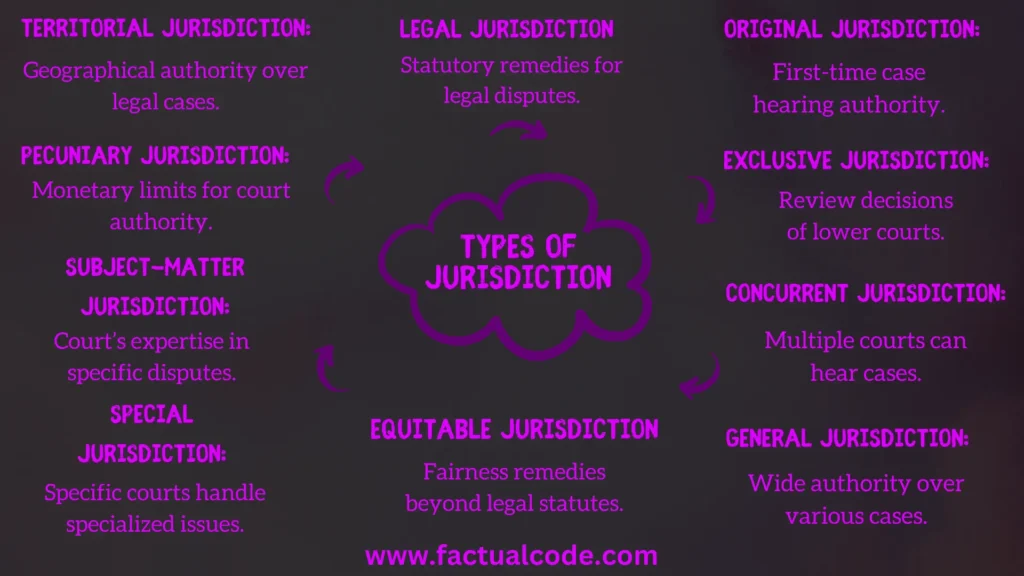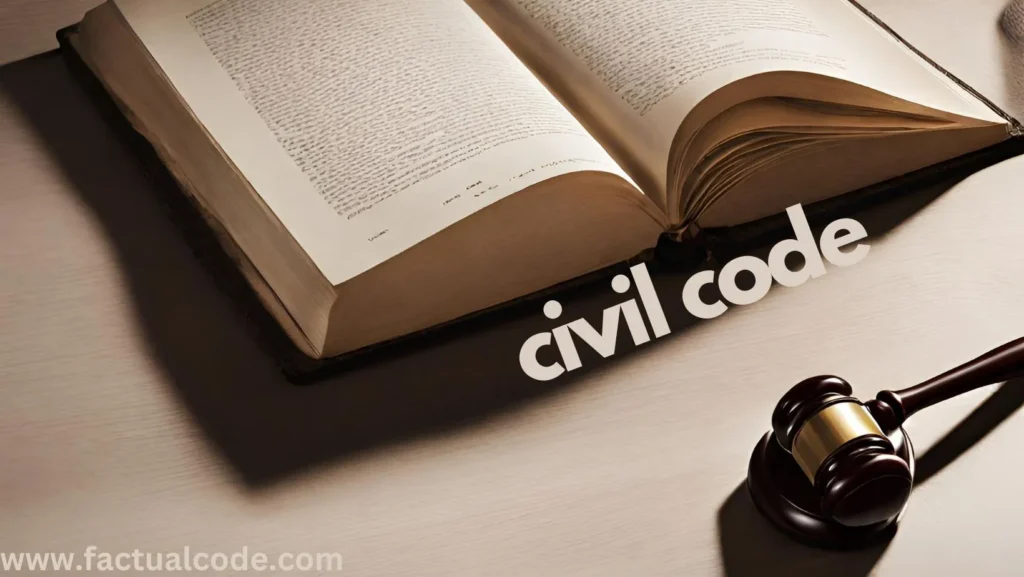1. Introduction
Jurisdiction refers to the legal authority of a court to hear and decide a case, as well as to enforce its judgments. Although the Code of Civil Procedure (CPC) does not explicitly define “jurisdiction,” its scope has been extensively developed through judicial interpretations. Jurisdiction is foundational to the administration of justice, ensuring that cases are adjudicated by the appropriate authority, safeguarding fairness, and maintaining order in legal proceedings.
In Hriday Nath Roy v. Ram Chandra (1921), the Calcutta High Court explained the concept of jurisdiction by emphasizing that a court’s jurisdiction is its power to hear, determine, and enforce judgments. The court also held that any act performed by a court outside its jurisdiction would be considered void or voidable, depending on the circumstances. This case highlights the fundamental principle that jurisdiction is essential for ensuring the validity and authority of a court’s decisions. It further established that actions taken without proper jurisdiction undermine the foundation of judicial processes.
2. Meaning of Jurisdiction
Jurisdiction outlines the boundaries within which a court can exercise its authority. These boundaries may be determined by territorial limits, the monetary value of the claim, or the subject matter of the dispute. For a case to proceed validly, the court must satisfy all these jurisdictional criteria.
3. Kinds of Jurisdiction with Case Laws
A. Territorial Jurisdiction
Territorial jurisdiction refers to the geographical area within which a court has the authority to adjudicate cases.
Relevant Provision: Section 16 CPC specifies that suits concerning immovable property must be filed in the court within whose territorial jurisdiction the property is located.
Case Law: Harshad Chiman Lal Modi v. DLF Universal Ltd. (2005)
In this case, the Supreme Court discussed territorial jurisdiction, emphasizing that disputes involving immovable property must be adjudicated within the jurisdiction where the property is located. Section 16 of the CPC clearly mandates that suits concerning immovable property should be filed in the court within whose territorial jurisdiction the property falls. The court held that the parties cannot bypass this rule through mutual agreement unless explicitly permitted by a statute. This case illustrates the strict territorial limits within which a court can exercise its jurisdiction, especially in property-related disputes.
B. Pecuniary Jurisdiction
Pecuniary jurisdiction refers to a court’s authority based on the monetary value of the claim. This ensures that cases are heard at the appropriate level of the judicial hierarchy.
Relevant Provision: Section 15 CPC requires that suits be filed in the court of the lowest competent pecuniary jurisdiction.
Case Law: State of Bombay v. Narothamdas Jethabai (1950)
In State of Bombay v. Narothamdas Jethabai, the Supreme Court dealt with pecuniary jurisdiction, which refers to the court’s authority based on the monetary value of the claim. The case discussed the Bombay City Civil Court Act, 1948, which allowed the Provincial Government to define the pecuniary jurisdiction of the Bombay City Civil Court. The court upheld that the legislature had the authority to regulate the pecuniary jurisdiction, including setting limits for the monetary value of suits that could be heard by the court. The judgment reinforces the principle that the court’s authority is determined not just by geographical limits (territorial jurisdiction) but also by the financial scope of the dispute.
C. Subject-Matter Jurisdiction
Subject-matter jurisdiction pertains to a court’s authority to hear cases of a particular category or type.
Relevant Provision: Section 21 CPC states that objections to jurisdiction should be raised at an early stage of proceedings.
Case Law: Ishwar Singh v. State of Rajasthan (2005)
In Ishwar Singh v. State of Rajasthan, the Supreme Court addressed subject-matter jurisdiction, which refers to the court’s authority to hear certain types of cases based on the subject or category of dispute. The Court emphasized that a court must have jurisdiction over the subject matter for the case to proceed. For example, certain disputes, such as matrimonial or tax-related issues, fall under the exclusive jurisdiction of specialized courts. The ruling reinforced that subject-matter jurisdiction is fundamental for judicial discipline, ensuring that each case is handled by a court with the requisite expertise and authority to deal with the specific issue involved.
D. Original and Appellate Jurisdiction
Original Jurisdiction: Refers to a court’s authority to hear a case for the first time. For instance, under Article 131 of the Constitution, the Supreme Court exercises original jurisdiction in disputes between states.
Appellate Jurisdiction: Refers to a court’s authority to review decisions made by lower courts.
Case Law: L. Chandra Kumar v. Union of India (1997)
In L. Chandra Kumar v. Union of India, the Supreme Court examined the relationship between original and appellate jurisdiction. Original jurisdiction refers to the court’s power to hear a case for the first time, while appellate jurisdiction allows a higher court to review and potentially overturn the decisions of lower courts. The case concerned constitutional matters and appeals from tribunals, and the Court underscored the Supreme Court’s supervisory role over constitutional disputes. The ruling highlighted how the jurisdictional boundaries between original and appellate authority function in India’s legal system.
E. Exclusive and Concurrent Jurisdiction
Exclusive Jurisdiction: Only one court has authority over a particular matter.
Concurrent Jurisdiction: More than one court may have the authority to hear the case.
Case Laws:
- Allahabad Bank vs. Canara Bank & Another (10 April 2000):
In Allahabad Bank vs. Canara Bank & Another, the Supreme Court discussed the principle of exclusive jurisdiction, particularly regarding banking disputes. The Court emphasized that when a specific statute or provision designates a particular court to handle disputes related to a specific subject, that court has exclusive jurisdiction. In the case of banking disputes, the Court ruled that the designated court with the expertise to address banking-related issues must hear the matter. This case reinforces the concept that certain disputes, particularly those governed by specialized laws, must be handled by courts designated specifically for those matters, ensuring that cases are adjudicated by a court with relevant knowledge and expertise.
- M. C. Mehta v. Union of India (1987): In M. C. Mehta v. Union of India, the Supreme Court dealt with concurrent jurisdiction, where multiple courts have the authority to hear a case. The Court emphasized that concurrent jurisdiction is critical for ensuring access to justice. In this case, the Court held that various courts could address matters concerning the environment, acknowledging that it is essential to have multiple forums with concurrent jurisdiction to ensure that cases are addressed promptly and effectively, especially in public interest litigation (PIL) matters. This case demonstrates that while courts may have overlapping jurisdiction, their combined efforts ensure broader access to justice.
- Allahabad Bank vs. Canara Bank & Another (10 April 2000):
F. General and Special Jurisdiction
General Jurisdiction: Courts with broad authority to hear various cases, including civil, criminal, and family disputes.
Special Jurisdiction: Limited to specific matters, such as consumer disputes, labor disputes, or taxation issues.
Case Law: Laxmi Engineering Works v. P.S.G. Industrial Institute (1995)
In Laxmi Engineering Works v. P.S.G. Industrial Institute, the Supreme Court addressed the distinction between general and special jurisdiction. General jurisdiction allows courts to hear a wide variety of cases, including civil, criminal, and family matters. However, specialized or special jurisdiction is confined to specific areas of law, such as consumer disputes or labor matters. The Court ruled that cases within the scope of specialized laws, like the Consumer Protection Act, should not be heard by general civil courts. This decision reinforced the exclusivity of specialized tribunals and forums in certain legal areas.
G. Legal and Equitable Jurisdiction
Legal Jurisdiction: Refers to remedies explicitly provided by statutes, such as damages or specific performance.
Equitable Jurisdiction: Grants courts the discretion to provide remedies when legal solutions are inadequate, focusing on fairness and justice.
Case Law: K.K. Velusamy vs. N. Palaanisamy (2011)
In K.K. Velusamy v. N. Palaanisamy, the Supreme Court discussed legal and equitable jurisdiction in the context of the Domestic Violence Act. Legal jurisdiction refers to cases where the law explicitly provides a remedy, such as compensation or maintenance. On the other hand, equitable jurisdiction refers to the court’s ability to grant remedies based on fairness, particularly when the legal remedies are inadequate.
The Court emphasized that civil courts have the legal jurisdiction to entertain cases under the Domestic Violence Act, applying statutory norms to protect victims. However, the Court also noted the importance of equitable jurisdiction in granting remedies that go beyond strict legal norms. For example, protection orders and relief in domestic violence cases may not always have clear statutory provisions but may still be granted by courts to ensure fairness and justice. The case demonstrates the Court’s ability to invoke both legal and equitable jurisdiction to deliver justice in cases where the law may not provide a clear solution.
H. Civil Court Jurisdiction
Civil courts have the authority to hear all disputes of a civil nature unless explicitly barred by a statute.
Relevant Provision: Section 9 CPC outlines the broad jurisdiction of civil courts.
Case Law: Shankar Narayanan Potti v. K. Sreedevi
In Shankar Narayanan Potti v. K. Sreedevi, the Supreme Court reasserted the broad jurisdiction of civil courts under Section 9 of the CPC, which grants civil courts the authority to hear all civil matters unless expressly barred by law. The Court ruled that civil courts retain jurisdiction over matters unless a specific statute excludes their authority or provides an alternative remedy. This case underscores the central role of civil courts in adjudicating disputes of a civil nature, reaffirming the principle that civil courts are the default forum for resolving civil disputes unless otherwise specified by law.

4. Lack of Jurisdiction and Void Judgments
When a court acts without jurisdiction, its decisions are void and unenforceable. This principle was highlighted in Dhulabhai v. State of MP, where the Supreme Court explained that when a court lacks jurisdiction, any order or judgment it passes is void. This case set out guidelines for determining when a civil court’s jurisdiction is barred, emphasizing the importance of jurisdiction as a threshold issue. The Court ruled that a court cannot act outside its jurisdiction, and any order passed without jurisdiction would have no legal effect. This principle highlights the fundamental role of jurisdiction in the legal system and the invalidity of judgments made without the requisite authority.
5. Conclusion
Jurisdiction is a critical principle that underpins the legal system and ensures that courts exercise their authority within proper boundaries. The case laws mentioned above reflect how different types of jurisdiction whether territorial, pecuniary, subject matter, or others serve to organize and structure the judicial system, ensuring that disputes are heard by the appropriate forum. Each case has helped define the scope and limits of judicial authority, ensuring a fair and just process for all parties involved.
References- THE CODE OF CIVIL PROCEDURE, 1908 Hriday Nath Roy v. Ram Chandra (1921) Section 16 CPC Harshad Chiman Lal Modi v. DLF Universal Ltd. (2005) Harshad Chiman Lal Modi v. DLF Universal Ltd. (2005) State of Bombay v. Narothamdas Jethabai (1950) Ishwar Singh v. State of Rajasthan (2005) Section 21 CPC L. Chandra Kumar v. Union of India (1997) Allahabad Bank vs. Canara Bank & Another (10 April 2000) M. C. Mehta v. Union of India (1987) Laxmi Engineering Works v. P.S.G. Industrial Institute (1995) K.K. Velusamy vs. N. Palaanisamy (2011) Shankar Narayanan Potti v. K. Sreedevi Dhulabhai v. State of MP

